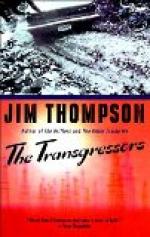“We are content to work in our present places,” some of the laborers assert. “Are we not sure of getting our bread as it is? If we were to bring on a revolution where would our next day’s wage come from?”
To this argument, which exhibits to what a debased position the wage-earner has sunk, the Independence party leaders who have formed the party of the fragment of free-minded men that still remains, marshal all the arguments of logic and political economy. They appeal to the pride, the decency of the men, to drag themselves from the slough into which they have fallen. The appeals are fervent, yet their effect seems uncertain.
The terror of “lock-outs,” of massacres done under the seal of the law, is vividly recalled.
In 1900 the people had made a desperate effort to throw off the yoke of the Trusts. They had failed and been made to feel the lash of their victors. Eight years have passed, during which the Trusts have become impregnable, the people impotent.
Trueman is in St. Louis on a flying trip. This city of two millions is the great centre of the labor organizations.
It is Friday night, and the local headquarters is the scene of wild excitement. It resembles nothing more closely than a camp on the eve of battle. Leaders from all districts of the city are on hand to receive final instructions, as in a camp they would be given ammunition, rations and assignment of positions. The determined expression that marks the face of a man who is set at a task which involves his entire future, is upon every man who enters the headquarters. The fountain of their inspiration is Trueman, who has a word for everyone. He seems to be everywhere and to be able to do all things.
From the hour of his triumph at Chicago he has won the support of the rural districts. Mass meetings have been held in villages, hamlets and cross-roads in all the States. In the smaller towns the people have likewise hailed Trueman as their deliverer. It is the good fortune of those dwelling outside of the cities to be still in possession of the dormant spirit of independence. They have been crushed, yet not cowed by the Trusts.
The fact that they are self-supporting in so far as procuring the actual necessities of food and shelter, make them capable of retaining a hope for emancipation from Trust domination.
The wage-slaves of the cities are in a condition actually appalling. It is part of Trueman’s campaign to go amongst the shops and factories in the environs of the cities to talk with the men, and to picture to them the results that will follow their voting in their own interests. He has seen poverty in its most direful forms.
The evening has worn on until it is within an hour of midnight. Reporters come and go; the last of the committeemen has said good night. Trueman is alone with his secretary, Herbert Benson.




